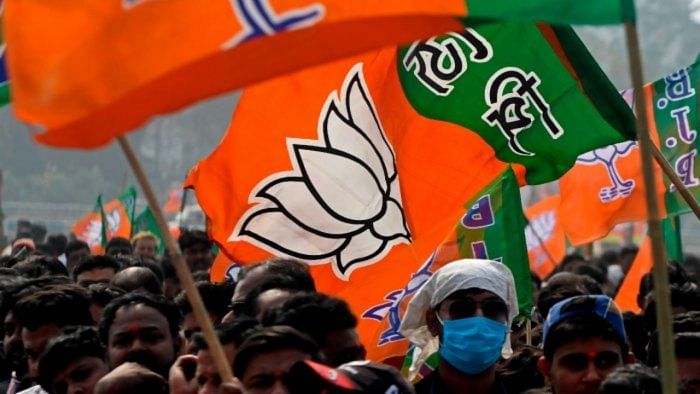
The general sentiment is that the Bharatiya Janata Party (BJP) has been made to eat crow, a sentiment that is shared even by its ranks when it was forced to act against two of its office bearers for anti-Islam comments after angry reactions from Muslim countries. However, the story seems to be taking another turn, and it may favour the BJP's politics of Hindutva.
The BJP's action against its spokespersons for hate speech came just a few days after India had ticked off the US after the US Secretary of State Antony Blinken, while delivering his speech on the 2021 Report on International Religious Freedom, named India among countries where there were rising instances of attacks on minorities and threats to religious freedom. India's Ministry of External Affairs (MEA) hit back, terming the report as "ill-informed".
It has been quite a see-saw. And, it isn't over yet.
The MEA's response to the US came on June 3, a day after Blinken had made the statement. A day later, a comment by BJP spokesperson Nupur Sharma on May 26 – a week before Blinken's statement on June 2 – and a tweet by Delhi BJP's Naveen Jindal on June 1 came to haunt the BJP.
Just a day after the MEA had told the US off and asked it to stay away from India's internal matters, on June 4, the Grand Mufti of the Sultanate of Oman, Ahmed bin Hamad al-Khalili decried the comments made by the BJP spokespersons. Some markets in the Gulf pulled Indian products. Then, Qatar, Kuwait and Iran summoned Indian ambassadors.
The BJP put out a statement affirming its faith in India's traditional values, respect for all religions and unity in diversity, and suspended Sharma and expelled Jindal. This was in stark contrast to how it had rewarded the "fringe" elements so far: Tajinder Bagga, Kapil Mishra, Anurag Thakur, Tejasvi Surya, and Pragya Thakur among them.
The Hindutva brigade that had felt reassured after the Modi government's rebuke to the US was aghast, while the Opposition parties, and others opposed to the BJP's Hindutva-based politics, said the "punishment" was not enough. It was merely a damage control exercise. They accused the BJP of denigrating India and diminishing its stature in the world.
In the BJP and Hindutva circles, on the other hand, there was a surge of sympathy for the two spokespersons. The Hindutva brigade saw the BJP's action against its spokespersons as letting down Hindus under pressure from Muslims. After all, Sharma and Jindal were only putting the traitors of Hindu Rashtra in their place.
One thing becomes clear from this: the Hindutva brigade has not given up its cause. If anything, it has consolidated under what it sees as an attack on its objective.
In fact, in the final analysis, some developments may also end up backing them.
The Indian government's response has more or less resolved the issue at the level of the governments of Muslim countries, even though it continues to rankle many of their people – as evident in the boycott of Indian goods in some places.
However, the turn this episode seems to be taking is what the Hindutva brigade has been trying for, and it may get things just how it wanted them to be.
The global outrage, the lecture from the Taliban and then the Al-Qaeda threat to launch suicide attacks in Delhi, Mumbai, Uttar Pradesh and Gujarat against "saffron terrorists" – all these are bound to be portrayed as a Muslim attack on India and may ignite mayhem in an already polarised situation.
Also Read — Al-Qaeda warns of 'suicide bombings' in Delhi, Mumbai amid row over remarks on Prophet Mohammed
What the Hindutva forces have been trying is to radicalise Muslims through constant provocation: the manner in which the beef ban was imposed, mob lynching, targeted action against slaughterhouses, controversy over namaaz and azaan, seizing property, bulldozing houses, obstructing business, and attacking or targeting places of worship. They know the best way to radicalise is to attack religion and provoke a reaction. That reaction is necessary for a divisive campaign not to seem ridiculous and appear justified. Not that this thought has bothered them any.
The Muslims have not taken the bait so far, thankfully. One hopes this does not change. Trinamool Congress Rajya Sabha MP Jawahar Sircar expressed this fear in his tweet: "Al-Qaeda threatens terror attacks in Indian states over 'insult to the Prophet'". Very dangerous! Did it never strike Right-Wing...fanatics that needling Muslims non-stop for eight years would rebound someday?"
As Dr Tara Kartha, Distinguished Fellow at the Institute of Peace and Conflict Studies (IPCS), has put it that in the Al-Qaeda threat, "It is the internal threat that is more worrying. The Al-Qaeda's cadres don't necessarily have to travel to India to carry out an attack. Given the recent trends in India – most particularly on social media and some television channels – that paint all Muslims as terrorists and goad them on religious matters, some radicalisation is imminent."
If that happens, everything would be turned on its head. The BJP spokespersons would become stars in the party, martyrs to 'the cause'.
To end on a more positive note, fortunately, Muslims and their leadership have not yet responded to the Hindutva brigade in kind. The response to Al-Qaeda has also been heartening. The president of the All India Majlis-e-Ittehadul Muslimeen (AIMIM) and member of the Lok Sabha from Hyderabad, Asaduddin Owaisi, lashed out at terror outfit Al-Qaeda and asserted that Indian Muslims have rejected radicalisation.
"The name of our Prophet Muhammad PBUH is exalted and does not need terrorists like Al-Qaeda to defend it. May Allah SWT protect our country from the khawarij who spread violence and besmirch Islam's name. Hindutvavadis should know that Islam rejects terrorism," Owaisi tweeted.
(Rajesh Sinha is a journalist)
Disclaimer: The views expressed above are the author's own. They do not necessarily reflect the views of DH.